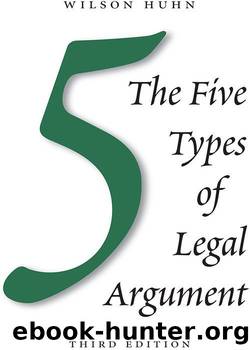The Five Types of Legal Argument, Third Edition by Huhn Wilson

Author:Huhn, Wilson [Huhn, Wilson]
Language: eng
Format: epub
Publisher: Carolina Academic Press
Published: 2014-04-30T16:00:00+00:00
CHAPTER 1 4
Intra-Type Attacks on
Tradition Arguments
Intra-type attacks on tradition arguments may assert that there is insufficient evidence that the tradition exists, may invoke a competing tradition, or may contend that a new tradition is emerging.
19. No Such Tradition Exists
The issue in Moore v. City of East Cleveland 301 concerned the constitutionality of a local “single family residential” zoning ordinance that defined the “family” in such a way as to prohibit two cousins from living in the same house with their grandmother. The Supreme Court, in an opinion written by Justice Lewis Powell, struck down the ordinance on the ground that it interfered with the “deeply rooted” tradition of persons living with extended family. 302 In dissent, Justice Byron White objected to this reasoning: “What the deeply rooted traditions of the country are is arguable; which of them deserve the protection of the Due Process Clause is even more debatable.” 303
As the following section illustrates, in most cases the difficulty is not proving that a tradition exists. Instead, the problem is that there also exists a competing tradition .
20. There Have Been Competing Traditions
In a famous passage from an opinion dissenting from the Supreme Court's denial of certiorari (the court's decision not to accept the case for review) in the contraception case Poe v. Ullman , 304 Justice Harlan recognized the possibility of conflicting traditions. He indicated that due process represents “the balance struck by this country, having regard to what history teaches are the traditions from which it developed as well as the traditions from which it broke. That tradition is a living thing.” 305
Competing traditions were also at work in Michael H. v. Gerald D . 306 The issue in that case was the constitutionality of a state law that conclusively presumed that the husband of a woman was the father of a child born during the marriage. The biological father (the wife's lover) challenged the presumption, and sought a ruling recognizing him as the father of his child. Justice Scalia, writing for the majority, and Justice Brennan, writing for the dissent, each invoked “tradition.” Justice Brennan cited the rights of “parenthood,” which are generally accorded to biological fathers. 307 Justice Scalia, on the other hand, relied upon “the historic respect—indeed, sanctity would not be too strong a term—traditionally accorded to the relationships that develop within the unitary family.” 308 Justice Scalia proposed a test for choosing between competing traditions. He urged that the controlling tradition should always be “the most specific level at which a relevant tradition . . . can be identified.” 30 9
21. A New Tradition Is Emerging
The most significant judicial attack upon “tradition” in recent years is contained in the 2003 decision of the Supreme Court in Lawrence v. Texas , 310 which accorded constitutional protection to people who engage in gay sex. In an extensive discussion in that case the Supreme Court employed a number of arguments rebutting the “tradition” that had been at the core of the Court's decision in Bowers v. Hardwick .
Download
This site does not store any files on its server. We only index and link to content provided by other sites. Please contact the content providers to delete copyright contents if any and email us, we'll remove relevant links or contents immediately.
Day by Elie Wiesel(2786)
The Age of Genius by A. C. Grayling(2592)
Gideon's Spies: The Secret History of the Mossad by Gordon Thomas(2355)
The Gulag Archipelago (Vintage Classics) by Aleksandr Solzhenitsyn(2106)
FATWA: Hunted in America by Pamela Geller(2013)
Columbine by Dave Cullen(1870)
Men Explain Things to Me by Rebecca Solnit(1729)
The Rule of Law by Bingham Tom(1701)
Anatomy of Injustice by Raymond Bonner(1671)
Examples & Explanations: Administrative Law by William F. Funk & Richard H. Seamon(1649)
Three Cups of Tea by Greg Mortenson(1620)
The Source by James A. Michener(1619)
That Every Man Be Armed by Stephen P. Halbrook(1584)
ADHD on Trial by Michael Gordon(1581)
Future Design by Unknown(1580)
Gideon's Spies by Gordon Thomas(1512)
Palestinian Walks by Raja Shehadeh(1499)
Constitutional Theory by Carl Schmitt(1458)
Nothing to Envy by Barbara Demick(1451)
